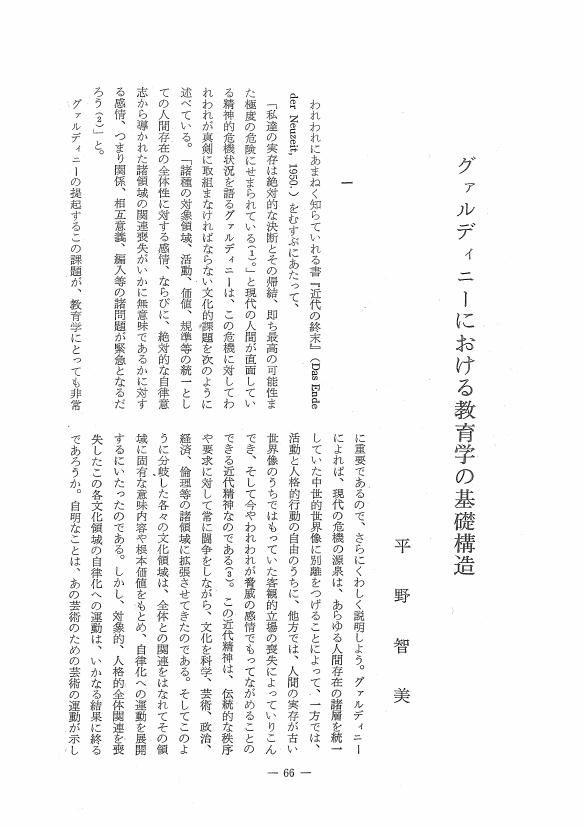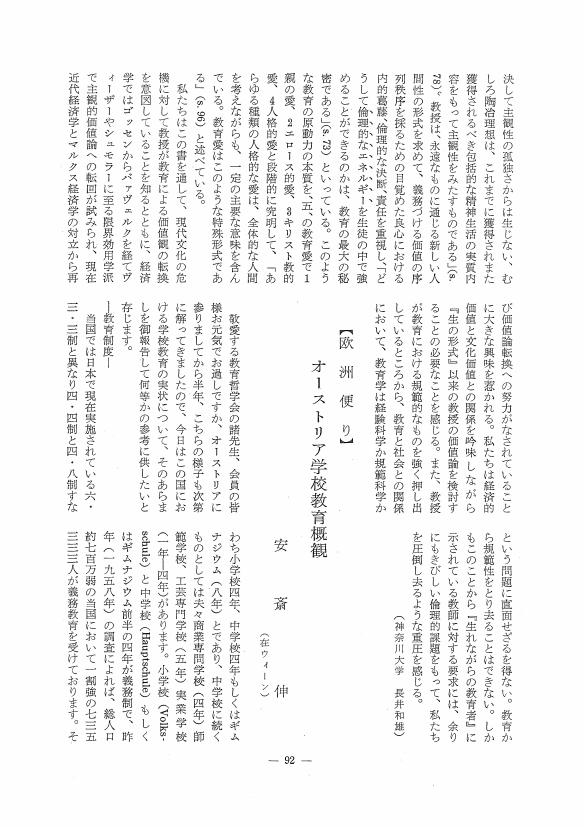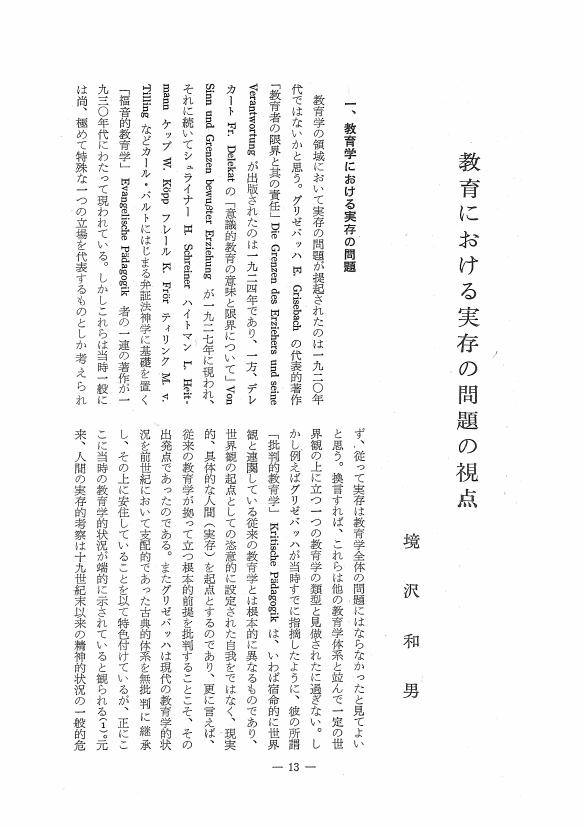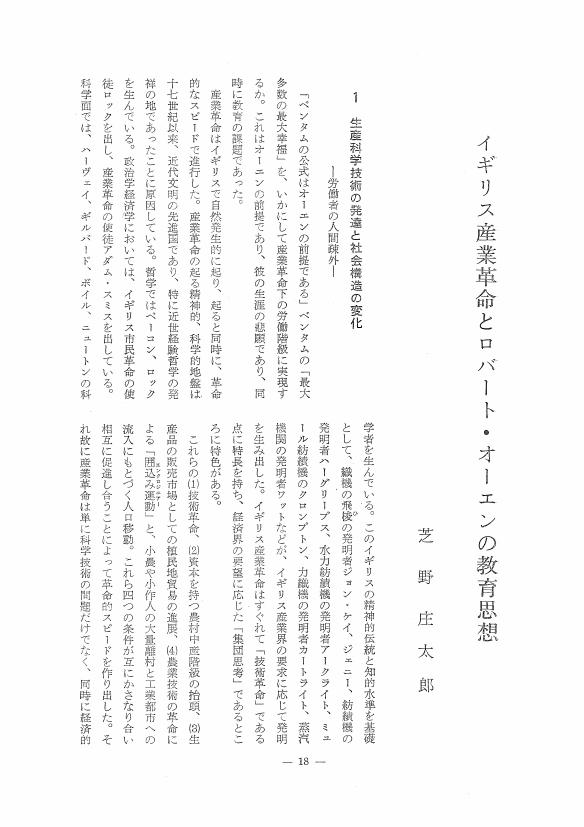1 0 0 0 OA ナトルプにおける労作人の構造について
- 著者
- 西頭 三雄児
- 出版者
- 教育哲学会
- 雑誌
- 教育哲学研究 (ISSN:03873153)
- 巻号頁・発行日
- vol.1960, no.3, pp.33-46, 1960 (Released:2010-01-22)
- 参考文献数
- 44
In this essay I consider Natorp's writings on the formation of homo faber, considered as part of the process of human formation. By “human formation” I mean the process of unlimited awareness, the essential ', starting point of which I wish to consider as labor. In Natorp's mind, labor is that genuinely human activity by which man establishes relations with the natural world. This activity, considered in its early and later stages, is not entirely the same, but in both stages it may be said to be the limiless exertion of a person as he aims at a spiritual idea. If Natorp's “awareness” is taken in the sense of laying hold of an idea, an essential relation between “awareness” and “labor” is indicated. We must remember that “awareness” in Natorp necessarily means social awareness. Consequently, a relation between it and socially cooperative labor is established. When labor is considered in its later stage and is grasped at a more profound level, it is seen in its dialectical character as a basic human activity rooted in intelligent volition. With his notion of “latent harmony” Natorp differs from Hegel in his dialectical theory and (unlike Hegel) was unable to conceive of the active meaning of contradiction. Natorp's special characteristic may be considered to lie in his concept of “the religion of labor” and of “leisure.”
1 0 0 0 OA シュプランガーにおける教育の本質概念について
- 著者
- 村田 昇
- 出版者
- 教育哲学会
- 雑誌
- 教育哲学研究 (ISSN:03873153)
- 巻号頁・発行日
- vol.1960, no.3, pp.47-59, 1960 (Released:2009-09-04)
- 参考文献数
- 17
「教育とは何か?」この問題に関しては、古来、多くの思想家や教育学者によって、さまざまな定義がくだされてきた。しかしそれらは十入十色であって、決して一様でない。それは、究極的には、その人それぞれの世界観に依存するものだからである。そうだといって、教育の定義や概念を各人各様の考えのままの無政府的な規定や使用に委ねるならば、教育活動における混乱は避けられ得ないであろう。ここに、それらの全体を通じて流れる何ものか、それらに共通の、教育固有の (pädagogisch・eigentlich) 本質といったものを見出すことの必要な所以がある。このことに関して、エドウァルト・シュプランガーが、その著『教育学的展望』 (Eduard Spranger : Pädagogische Perspektiven. Beiträgezu Erziehungsfragen der Gegenwart 1950.) において展開した見解は、示唆するところすこぶる多いものと思われる。これを、他の諸著作にあらわれた彼の見解によって拡大・深化しながら、教育の本質概念ともいうべきものを探り出そうとするのが、この小論のねらいである。
1 0 0 0 OA シュプランガーの内面的学校改革について 戦後シュプランガー教育思想の一考察
- 著者
- 天野 正治
- 出版者
- 教育哲学会
- 雑誌
- 教育哲学研究 (ISSN:03873153)
- 巻号頁・発行日
- vol.1960, no.3, pp.60-77, 1960 (Released:2010-01-22)
- 参考文献数
- 49
This essay pressents some considerations on the post-war educational thinking of the renowned German scholar, Eduard Spranger. It is his theory of culture wich forms the background and the foundation of his post-war thinking. For the sake of convenience, this theory is divided into three parts : a general theory of culture ; criticism of modern culture ; criticism of the culture of west Germany. Modern culture, as Spranger sees it, is in a diseased state. He argues that it can be restored to a state of health through an improvement in its moral, legal, and political functioning, and to this end education for consientious living and for political activity based on a moral foundation must be carried on. If we look at school education from this point of view, we see that it must be thoroughly reformed ; and this is Spranger's contention. The concrete development of his theory is precisely his “theory of the inner renovation of the school.” Consequently, I have taken this expression of Spranger as the leit-motif of his post-war educational thought and traced its concrete development from the point of view of the objectives, the content, and the social aspects of education.
1 0 0 0 OA ルネ・ユベール「一般教育学」
- 著者
- 周郷 博
- 出版者
- 教育哲学会
- 雑誌
- 教育哲学研究 (ISSN:03873153)
- 巻号頁・発行日
- vol.1960, no.3, pp.78-79, 1960 (Released:2009-09-04)
1 0 0 0 OA ロバート・M・ハッチンズ「教育における葛藤」
- 著者
- 市村 尚久
- 出版者
- 教育哲学会
- 雑誌
- 教育哲学研究 (ISSN:03873153)
- 巻号頁・発行日
- vol.1960, no.3, pp.79-82, 1960 (Released:2009-09-04)
1 0 0 0 OA 道徳的思考における言語記号の喚情的機能
- 著者
- 宇佐美 寛
- 出版者
- 教育哲学会
- 雑誌
- 教育哲学研究 (ISSN:03873153)
- 巻号頁・発行日
- vol.1960, no.2, pp.47-65, 1960-03-01 (Released:2010-05-07)
- 参考文献数
- 29
1 0 0 0 OA グァルディニーにおける教育学の基礎構造
- 著者
- 平野 智美
- 出版者
- 教育哲学会
- 雑誌
- 教育哲学研究 (ISSN:03873153)
- 巻号頁・発行日
- vol.1960, no.2, pp.66-76, 1960-03-01 (Released:2009-09-04)
- 参考文献数
- 29
1 0 0 0 OA アメリカ教育とジョン・デューイ
- 著者
- ブルーエット S・J
- 出版者
- 教育哲学会
- 雑誌
- 教育哲学研究 (ISSN:03873153)
- 巻号頁・発行日
- vol.1960, no.2, pp.77-80, 1960-03-01 (Released:2010-05-07)
1 0 0 0 OA ジョージ・F・ネラー「実存主義と教育」
- 著者
- 中嶋 博
- 出版者
- 教育哲学会
- 雑誌
- 教育哲学研究 (ISSN:03873153)
- 巻号頁・発行日
- vol.1960, no.2, pp.81-82, 1960-03-01 (Released:2009-09-04)
- 参考文献数
- 1
1 0 0 0 OA アメリカ教育哲学の現状
- 著者
- 新堀 通也
- 出版者
- 教育哲学会
- 雑誌
- 教育哲学研究 (ISSN:03873153)
- 巻号頁・発行日
- vol.1960, no.2, pp.83-85, 1960-03-01 (Released:2009-09-04)
1 0 0 0 OA アメリカの生活から
- 著者
- 村井 実
- 出版者
- 教育哲学会
- 雑誌
- 教育哲学研究 (ISSN:03873153)
- 巻号頁・発行日
- vol.1960, no.2, pp.85-87, 1960-03-01 (Released:2009-09-04)
十二月二十日に稲富先生がボストンに見え、ちょうど二週間滞在されました。ガツガツと読書に明け暮れていた私の生活にとっては、あたかもクリスマス、新年の休み中ではあり、みじめな教育問題への関心から魂を解放する絶好の機会であったようです。昨日 (四日) 稲富先生をニェーヨークへ送って、明日から再び教育問題にとりつくわけですが、ああ、今日の日がもっともっと長ければ良いのに。
1 0 0 0 OA シラーの homo ludens 的人間論
- 著者
- 増永 良丸
- 出版者
- 教育哲学会
- 雑誌
- 教育哲学研究 (ISSN:03873153)
- 巻号頁・発行日
- vol.1960, no.3, pp.1-18, 1960 (Released:2009-09-04)
- 参考文献数
- 19
We can conceive of man both as homo sapiens and, along lines indicated by such thinkers as Plato and H. Read, as homo ludens. Friederich Schiller's philosophy of man, as developed especially in his Letters on the Aesthetic Education of Man, can certainly be said to be a philosophy of man based on transcendentalism. Schiller, that is to say, conceives of man as composed of three basic impulses the motivational Formtrieb, the Sachtrieb, and the Spieltrieb.It is this third impulse, the Spieltrieb discovered by Schiller at the very center of human nature, which enables man to escape from the exclusive domination of the first two impulses, to enter into a state of reciprocal action and of harmonious union with his fellows, and to. rejoice in freedom as a total unit. It is this Spieltrieb which is man's highest perfection. Its object, according to Schiler, is beauty, and it is precisely homo ludens, man as seeing for beauty, who is the key figure in the transforming action that leads to the ideal moral kingdom. It is at this point that Schiller's philosophy of man is revealed in its educational significance.
1 0 0 0 OA ゲーテの「ファウスト」における世界観と人間像
- 著者
- 志賀 英雄
- 出版者
- 教育哲学会
- 雑誌
- 教育哲学研究 (ISSN:03873153)
- 巻号頁・発行日
- vol.1960, no.3, pp.19-32, 1960 (Released:2009-09-04)
My essay concerns the meaning which Goeth's Faust has for specialists in educational fields. This work of Goethe is certainly one of those books which anyone with a reflective interest in the formation of his own humanity must be familiar with. The reason for this is that Goethe, with his perceptive and prophetic intuition and reflection, presented in symbolic language to the human race that many-faceted idea of the universe and that truth about human nature which only a genius was able to reach. Tne basis of the reputation of Goethe as the “prophet of the new humanity” and of Faust as the “bible of humanity” would seem to lie in the humanistic truth threaded together by the lofty, active idealism revealed in Faust. With this insight to guide me, I have, tried to interpert Faust from the viewpoint of educational philosophy. I cannot help but think that those who have been able to reach some depth in their understanding of Faust are much closer to educational truth than those who are unfamiliar with the work.
1 0 0 0 OA 【欧洲便り】オーストリア学校教育概観
- 著者
- 安斎 伸
- 出版者
- 教育哲学会
- 雑誌
- 教育哲学研究 (ISSN:03873153)
- 巻号頁・発行日
- vol.1959, no.1, pp.92-95, 1959-06-10 (Released:2009-09-04)
1 0 0 0 OA 人間観の変遷と現代教育学
- 著者
- 杉谷 雅文
- 出版者
- 教育哲学会
- 雑誌
- 教育哲学研究 (ISSN:03873153)
- 巻号頁・発行日
- vol.1960, no.2, pp.1-12, 1960-03-01 (Released:2009-09-04)
1 0 0 0 OA 教育における実存の問題の視点
- 著者
- 境沢 和男
- 出版者
- 教育哲学会
- 雑誌
- 教育哲学研究 (ISSN:03873153)
- 巻号頁・発行日
- vol.1960, no.2, pp.13-26, 1960-03-01 (Released:2009-09-04)
- 参考文献数
- 23
1 0 0 0 OA ペスタロッチの das Leben bildetについて
- 著者
- 鈴木 謙三
- 出版者
- 教育哲学会
- 雑誌
- 教育哲学研究 (ISSN:03873153)
- 巻号頁・発行日
- vol.1960, no.2, pp.27-46, 1960-03-01 (Released:2010-01-22)
- 参考文献数
- 49
1 0 0 0 OA 創刊の辞
- 著者
- 稲富 栄次郎
- 出版者
- 教育哲学会
- 雑誌
- 教育哲学研究 (ISSN:03873153)
- 巻号頁・発行日
- vol.1959, no.1, pp.1, 1959-06-10 (Released:2009-09-04)
- 被引用文献数
- 1
1 0 0 0 OA 中江藤樹の教育哲学
- 著者
- 後藤 三郎
- 出版者
- 教育哲学会
- 雑誌
- 教育哲学研究 (ISSN:03873153)
- 巻号頁・発行日
- vol.1959, no.1, pp.2-17, 1959-06-10 (Released:2009-09-04)
1 0 0 0 OA イギリス産業革命とロバート・オーエンの教育思想
- 著者
- 芝野 庄太郎
- 出版者
- 教育哲学会
- 雑誌
- 教育哲学研究 (ISSN:03873153)
- 巻号頁・発行日
- vol.1959, no.1, pp.18-35, 1959-06-10 (Released:2010-01-22)
- 参考文献数
- 41













